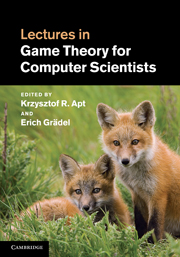Book contents
- Frontmatter
- Contents
- List of contributors
- Preface
- 1 A Primer on Strategic Games
- 2 Infinite Games and Automata Theory
- 3 Algorithms for Solving Parity Games
- 4 Back and Forth Between Logic and Games
- 5 Turn-Based Stochastic Games
- 6 Games with Imperfect Information: Theory and Algorithms
- 7 Graph Searching Games
- 8 Beyond Nash Equilibrium: Solution Concepts for the 21st Century
- Index
Preface
Published online by Cambridge University Press: 01 June 2011
- Frontmatter
- Contents
- List of contributors
- Preface
- 1 A Primer on Strategic Games
- 2 Infinite Games and Automata Theory
- 3 Algorithms for Solving Parity Games
- 4 Back and Forth Between Logic and Games
- 5 Turn-Based Stochastic Games
- 6 Games with Imperfect Information: Theory and Algorithms
- 7 Graph Searching Games
- 8 Beyond Nash Equilibrium: Solution Concepts for the 21st Century
- Index
Summary
Game playing is a powerful metaphor that fits many situations where interaction between autonomous agents plays a central role. Numerous tasks in computer science, such as design, synthesis, verification, testing, query evaluation, planning, etc. can be formulated in game-theoretic terms. Viewing them abstractly as games reveals the underlying algorithmic questions, and helps to clarify relationships between problem domains. As an organisational principle, games offer a fresh and intuitive way of thinking through complex issues.
As a result mathematical models of games play an increasingly important role in a number of scientific disciplines and, in particular, in many branches of computer science. One of the scientific communities studying and applying games in computer science has formed around the European Network ‘Games for Design and Verification’ (GAMES), which proposes a research and training programme for the design and verification of computing systems, using a methodology that is based on the interplay of finite and infinite games, mathematical logic and automata theory.
This network had initially been set up as a Marie Curie Research Training Network, funded by the European Union between 2002 and 2006. In its four years of existence this network built a strong European research community that did not exist before. Its flagship activity – the annual series of GAMES workshops – saw an ever-increasing number of participants from both within and outside Europe. The ESF Research Networking Programme GAMES, funded by the European Science Foundation ESF from 2008 to 2013, builds on the momentum of this first GAMES network, but it is scientifically broader and more ambitious, and it covers more countries and more research groups.
- Type
- Chapter
- Information
- Lectures in Game Theory for Computer Scientists , pp. ix - xiiPublisher: Cambridge University PressPrint publication year: 2011



